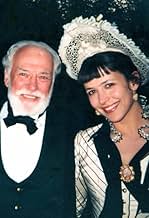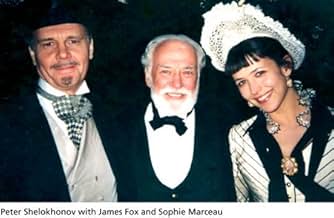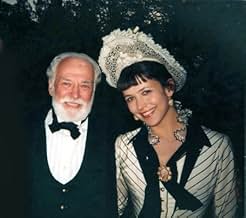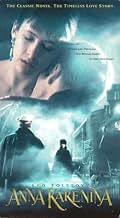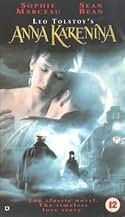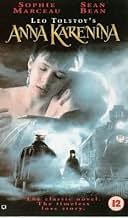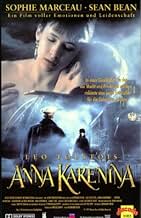IMDb RATING
6.3/10
6.4K
YOUR RATING
Anna (Marceau) is a wife and mother who has an affair with the handsome Count Vronsky (Bean). Based on the novel by Tolstoy.Anna (Marceau) is a wife and mother who has an affair with the handsome Count Vronsky (Bean). Based on the novel by Tolstoy.Anna (Marceau) is a wife and mother who has an affair with the handsome Count Vronsky (Bean). Based on the novel by Tolstoy.
Pyotr Shelokhonov
- Kapitonich, Chief Butler
- (as Pyotr Sholokhov)
- Director
- Writers
- All cast & crew
- Production, box office & more at IMDbPro
Featured reviews
According to an earlier review, this movie is supposed to be "just plan awful." The writer probably meant "plain" instead of "plan," and that misspelling may be an indication of the quality of the review.
There is much to be said for the viewpoint that this film version of Tolstoy's novel, starring Sophie Marceau, must certainly be one of the greatest versions ever produced.
Tolstoy himself lived to see just the beginning of the era of the motion picture and was said to have been fascinated by the possibilities the new medium presented. If so, he would no doubt have been quite astonished at the beauty and the extraordinary quality of this rendition of his story about Anna Karenina. The production values are among the highest there could possibly be. The costumes, the cinematography, and the sets unlike earlier versions, the film was shot on location in St. Petersburg and elsewhere in Russia are at such a remarkable level that the action almost does appear to be really taking place in the Czarist period at the end of the nineteenth century.
As for Sophie Marceau's mild French accent which the above-mentioned reviewer found so irritating it is quite likely that many upper-classes Russians of the period actually did speak with a French accent. It was not Russian but French that was the dominant language among the Russian nobility and aristocracy of the time for some, French was in fact their native language, since many of them never learned to speak Russian at all, except perhaps a few words and phrases they could use to communicate with the servants.
What is perhaps most remarkable of all in this film is the utterly believable way that the behavior of the of characters is presented. Their motives are suggested with great subtlety, not in the somewhat simplistic tones of the (nevertheless still magnificent) MGM version of the film that starred Greta Garbo seventy years ago. Anna's husband is not a monster, for example, in this new version, but a rather pathetic, right-wing government bureaucrat with obsessively strict moral values. Moreover, the portrayal of Anna's behavior throughout the film, and especially in the final scenes, is a masterpiece of sympathetic psychological insight and understanding.
This film is a for the time being, anyway neglected classic.
There is much to be said for the viewpoint that this film version of Tolstoy's novel, starring Sophie Marceau, must certainly be one of the greatest versions ever produced.
Tolstoy himself lived to see just the beginning of the era of the motion picture and was said to have been fascinated by the possibilities the new medium presented. If so, he would no doubt have been quite astonished at the beauty and the extraordinary quality of this rendition of his story about Anna Karenina. The production values are among the highest there could possibly be. The costumes, the cinematography, and the sets unlike earlier versions, the film was shot on location in St. Petersburg and elsewhere in Russia are at such a remarkable level that the action almost does appear to be really taking place in the Czarist period at the end of the nineteenth century.
As for Sophie Marceau's mild French accent which the above-mentioned reviewer found so irritating it is quite likely that many upper-classes Russians of the period actually did speak with a French accent. It was not Russian but French that was the dominant language among the Russian nobility and aristocracy of the time for some, French was in fact their native language, since many of them never learned to speak Russian at all, except perhaps a few words and phrases they could use to communicate with the servants.
What is perhaps most remarkable of all in this film is the utterly believable way that the behavior of the of characters is presented. Their motives are suggested with great subtlety, not in the somewhat simplistic tones of the (nevertheless still magnificent) MGM version of the film that starred Greta Garbo seventy years ago. Anna's husband is not a monster, for example, in this new version, but a rather pathetic, right-wing government bureaucrat with obsessively strict moral values. Moreover, the portrayal of Anna's behavior throughout the film, and especially in the final scenes, is a masterpiece of sympathetic psychological insight and understanding.
This film is a for the time being, anyway neglected classic.
To be honest, I have not read this book. I have heard that it was a classic and all those other things that people say about his book, but really had no idea what the story is about. Actually, the main reason that I watched this movie, was that Sean Bean was in it(I had previously seen him in Lord of the Rings, and really enjoyed him). I was surprised to find this story so engaging. I thought that he was amazing in this movie, very charming. He just has this intangible quality that always has me rooting for him.
This is the first movie that I have ever seen Sophie Marceau in(playing Anna Karenina) and I found that she portrays Anna with a delicate grace, that makes you understand Vronsky's(Bean) dogged pursuit of her.
True, I have to say that I found the end a little disappointing, and heart-wrenching. Sean Bean shines at the end of the movie, I think he really shows well just how much Vronsky finally realizes he has lost.
This is the first movie that I have ever seen Sophie Marceau in(playing Anna Karenina) and I found that she portrays Anna with a delicate grace, that makes you understand Vronsky's(Bean) dogged pursuit of her.
True, I have to say that I found the end a little disappointing, and heart-wrenching. Sean Bean shines at the end of the movie, I think he really shows well just how much Vronsky finally realizes he has lost.
Now, perhaps I'm out of my element writing a review for "Anna Karenina" without having read the book, but I shall do so regardless. Many criticised this film because it did not follow the book, or omitted one thing or another. That is all well and good, but what feature-length film *can* capture the entire scope of a novel the size of "Anna Karenina"? I watched the older version with Greta Garbo and--though I cannot imagine why--it never truly caught my attention. This version, however, captured me from the start. And I am usually the first one to complain about what is wrong with a remake in comparison to the old version. A paradox, indeed.
This film first caught my eye because of Sophie Marceau. I admire her immensely as an actress, having seen her in several films, both French and English. Then, I recognised Bernard Rose as the director of "Immortal Beloved", a film I had enjoyed some months before, mostly due to a magnificent performance by Gary Oldman, some of the most glorious music caught on film.
The music, I can probably cite as one of the main reasons I loved this film. I can think of no better love theme for a doomed romance like that of Anna and Vronsky, than the first movement of Tchaikovsky's Sixth Symphony. The use of "Swan Lake" at various points was also wonderful, and the interplay during the scene at the ballet held me mesmerised. Vronsky speaks of Anna being trapped in her marriage as the Prince seeks to capture the Swan Queen. Perhaps I'm just rambling, but somehow that connected.
On the whole, the performances were good. Sophie Marceau was perfectly believable as Anna, and some of her scenes sent chills down my spine, though my favourite performance of hers still has to be "Firelight". Sean Bean had me worried for a few seconds, with a mannered reading or two, but improved quickly as the film progressed. Another reviewer pointed out that Vronsky was meant to be a shallower character than Anna, and now that I think back on it, I believe that is very true, and that Sean Bean's performance reflected this superficiality. Mia Kirshner was adequate--I didn't particularly care for her--but Alfred Molina and James Fox both gave fine performances (a standout for me was when Anna wrote Karenin from Italy and Karenin wavered before refusing to let her see Sergei).
However, equally on par with the actors, was the setting. Very few films, I have to admit, can look *so* beautiful. Especially the ballroom scene, with the seemingly neverending hallway of gilded doors, the location photography was spectacular. The costumes were stunning, and the cinematography made even snow seem alive. Even if you do not care for the story or the acting, this is a film to watch for visuals.
Thus, I believe that this film deserves far more credit than it received. I, personally, loved it for varied reasons, but I have to admit that what truly captured me was the way Bernard Rose can take an average script and transform it into a beautiful film using visuals and music. Very few directors take the time to put music and image together if they use classical scores (my favourites would be David Lean and John Boorman), and I believe Bernard Rose should be watched in the future. I should love to see what he would do with a film set in late 19th century Italy, when opera was at its height!
***1/2 out of ****
This film first caught my eye because of Sophie Marceau. I admire her immensely as an actress, having seen her in several films, both French and English. Then, I recognised Bernard Rose as the director of "Immortal Beloved", a film I had enjoyed some months before, mostly due to a magnificent performance by Gary Oldman, some of the most glorious music caught on film.
The music, I can probably cite as one of the main reasons I loved this film. I can think of no better love theme for a doomed romance like that of Anna and Vronsky, than the first movement of Tchaikovsky's Sixth Symphony. The use of "Swan Lake" at various points was also wonderful, and the interplay during the scene at the ballet held me mesmerised. Vronsky speaks of Anna being trapped in her marriage as the Prince seeks to capture the Swan Queen. Perhaps I'm just rambling, but somehow that connected.
On the whole, the performances were good. Sophie Marceau was perfectly believable as Anna, and some of her scenes sent chills down my spine, though my favourite performance of hers still has to be "Firelight". Sean Bean had me worried for a few seconds, with a mannered reading or two, but improved quickly as the film progressed. Another reviewer pointed out that Vronsky was meant to be a shallower character than Anna, and now that I think back on it, I believe that is very true, and that Sean Bean's performance reflected this superficiality. Mia Kirshner was adequate--I didn't particularly care for her--but Alfred Molina and James Fox both gave fine performances (a standout for me was when Anna wrote Karenin from Italy and Karenin wavered before refusing to let her see Sergei).
However, equally on par with the actors, was the setting. Very few films, I have to admit, can look *so* beautiful. Especially the ballroom scene, with the seemingly neverending hallway of gilded doors, the location photography was spectacular. The costumes were stunning, and the cinematography made even snow seem alive. Even if you do not care for the story or the acting, this is a film to watch for visuals.
Thus, I believe that this film deserves far more credit than it received. I, personally, loved it for varied reasons, but I have to admit that what truly captured me was the way Bernard Rose can take an average script and transform it into a beautiful film using visuals and music. Very few directors take the time to put music and image together if they use classical scores (my favourites would be David Lean and John Boorman), and I believe Bernard Rose should be watched in the future. I should love to see what he would do with a film set in late 19th century Italy, when opera was at its height!
***1/2 out of ****
This was surprisingly good. I'm not that much a fan of the Romance genre, if truth be told, but I'll make an exception for this one. The film is carefully crafted. Every emotion, every dialogue enhanced the overall tone of the film, slowly but surely escalating in its momentum up to its tragic climax.
Sophie Marceau was brilliant. As was Sean Bean. I wasn't quite sure if they would be able to possess the kind of chemistry needed to pull this off, if truth be told, considering how they (in my opinion) seem to be of different temperament artistically (Sophie being more sensitive as seen in Braveheart and Marquis, while Bean is more explosive). Nevertheless, it worked out fine although, ironically, their relationship seem to be more believable whenever they fell out of odds with each other. :)
Sophie Marceau was brilliant. As was Sean Bean. I wasn't quite sure if they would be able to possess the kind of chemistry needed to pull this off, if truth be told, considering how they (in my opinion) seem to be of different temperament artistically (Sophie being more sensitive as seen in Braveheart and Marquis, while Bean is more explosive). Nevertheless, it worked out fine although, ironically, their relationship seem to be more believable whenever they fell out of odds with each other. :)
Which is entirely to be expected with a novel the size and complexity, I'm told, of Leo Tolstoy's "Anna Karenina", which I have not read.
I will blushingly admit that I first viewed this film mostly because of Sean Bean's presence. I found him a superb actor in the Lord of the Rings, and hoped to find more in his other works.
Truthfully, his portrayal of Vronsky feels somewhat light in this film; I attribute this to three factors: the severe compression of the novel (as happens with all film adaptations), the actual nature of the character itself, and the slightly boring task of playing mostly passion. Unlike other viewers, I found it very difficult to sympathize with Vronsky, and his repentance hollow. My heart melted somewhat, though, during his flashback to Karenina's corpse at the railway, and his brimming eyes as the train pulled away. Redeemed slightly at the very last moment.
Sophie Marceau is stunning as Anna Karenina; I found her enchanting from the start. Marceau plays the title lady with dignity, elegance, and grace; in her more intimate and emotional moments, she portrays Karenina's motherly and passionate sides with skill.
The inevitable flaws of adaptation show through in this film; there are numerous location changes, and multiple "quick" passages of time. Every event feels strung together by a thread, which they likely are, chosen for their narrative value. Yet it doesn't work, as the overall result lacks a palatable sense of cohesion. The love story of Karenina and Vronsky feels chopped and rushed, as does the tale of Levin and his Kitty -- which is too bad, since they are both the anchor narratives. The contrast of the two, however, plays well, and reminds me of the romances in Michael Ondaatje's "English Patient" (I'm well aware Tolstory precedes Ondaatje).
The greatest features of "Anna Karenina" lie in the atmosphere. Despite the out-of-place original accents of the actors, Russian is spoken skilfully, and the chosen music is beautiful and appropriately evocative of an older, grander time. and the lovely landscapes of Russia play a beautiful role in the background. The costumes and sets are breathtaking; the highlight is surely the ballroom scene, when all are attired for an evening "out" and Tchaikovsky's Swan Lake Waltz is playing.
While an excellent effort, "Anna Karenina" eventually feels like what it is: a cinematic adaptation of a novel.
I'd give it a 8 out of 10.
I will blushingly admit that I first viewed this film mostly because of Sean Bean's presence. I found him a superb actor in the Lord of the Rings, and hoped to find more in his other works.
Truthfully, his portrayal of Vronsky feels somewhat light in this film; I attribute this to three factors: the severe compression of the novel (as happens with all film adaptations), the actual nature of the character itself, and the slightly boring task of playing mostly passion. Unlike other viewers, I found it very difficult to sympathize with Vronsky, and his repentance hollow. My heart melted somewhat, though, during his flashback to Karenina's corpse at the railway, and his brimming eyes as the train pulled away. Redeemed slightly at the very last moment.
Sophie Marceau is stunning as Anna Karenina; I found her enchanting from the start. Marceau plays the title lady with dignity, elegance, and grace; in her more intimate and emotional moments, she portrays Karenina's motherly and passionate sides with skill.
The inevitable flaws of adaptation show through in this film; there are numerous location changes, and multiple "quick" passages of time. Every event feels strung together by a thread, which they likely are, chosen for their narrative value. Yet it doesn't work, as the overall result lacks a palatable sense of cohesion. The love story of Karenina and Vronsky feels chopped and rushed, as does the tale of Levin and his Kitty -- which is too bad, since they are both the anchor narratives. The contrast of the two, however, plays well, and reminds me of the romances in Michael Ondaatje's "English Patient" (I'm well aware Tolstory precedes Ondaatje).
The greatest features of "Anna Karenina" lie in the atmosphere. Despite the out-of-place original accents of the actors, Russian is spoken skilfully, and the chosen music is beautiful and appropriately evocative of an older, grander time. and the lovely landscapes of Russia play a beautiful role in the background. The costumes and sets are breathtaking; the highlight is surely the ballroom scene, when all are attired for an evening "out" and Tchaikovsky's Swan Lake Waltz is playing.
While an excellent effort, "Anna Karenina" eventually feels like what it is: a cinematic adaptation of a novel.
I'd give it a 8 out of 10.
Did you know
- TriviaThis was the first western production of "Anna Karenina" to be filmed in Russia (St. Petersburg).
- GoofsDuring the movie, title cards inform the viewer that the story arch unfolds in the years 1880 to 1882 - yet at the end of the movie Vronsky leaves to fight in the Russo-Turkish war of 1877- 1878.
- Quotes
Anna Karenina: What are you doing here?
Vronsky: You know that I have come to be where you are. I cannot help myself.
- ConnectionsReferenced in 13 posterunek: Kalambury filmowe (1998)
- SoundtracksSymphony No. 6 in B Minor, op. 74 (Pathetique)
Written by Pyotr Ilyich Tchaikovsky (as Peter Ilyich Tchaikovsky)
Performed by The St. Petersburg Philharmonic Orchestra
Conducted by Georg Solti (as Sir Georg Solti)
Courtesy of Icon Records and London Records
- How long is Anna Karenina?Powered by Alexa
Details
- Release date
- Countries of origin
- Official sites
- Languages
- Also known as
- Anna Karenina
- Filming locations
- Production companies
- See more company credits at IMDbPro
Box office
- Budget
- $35,000,000 (estimated)
- Gross US & Canada
- $858,553
- Opening weekend US & Canada
- $75,268
- Apr 6, 1997
- Gross worldwide
- $858,553
- Runtime
- 1h 48m(108 min)
- Color
- Sound mix
- Aspect ratio
- 2.35 : 1
Contribute to this page
Suggest an edit or add missing content


